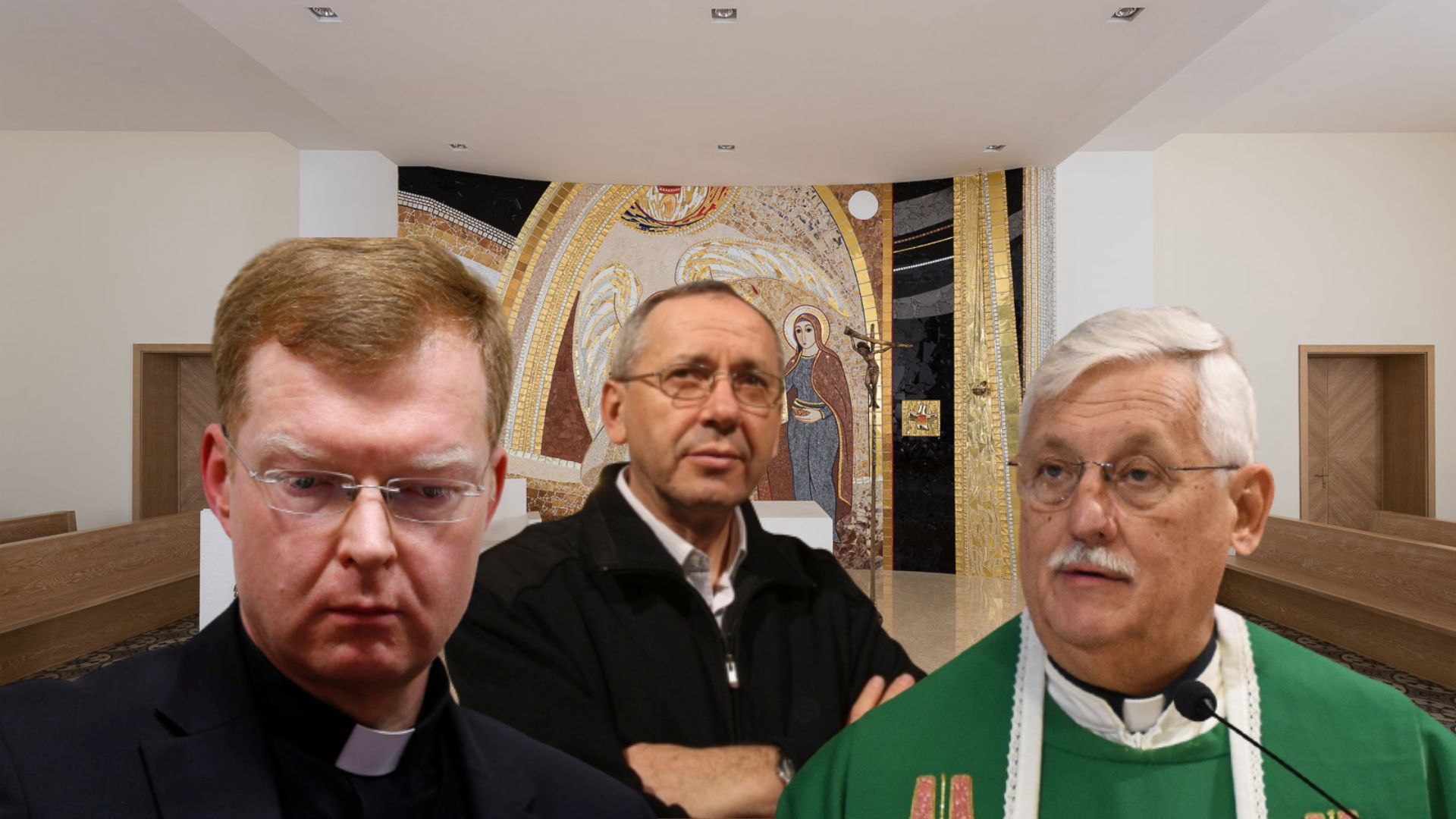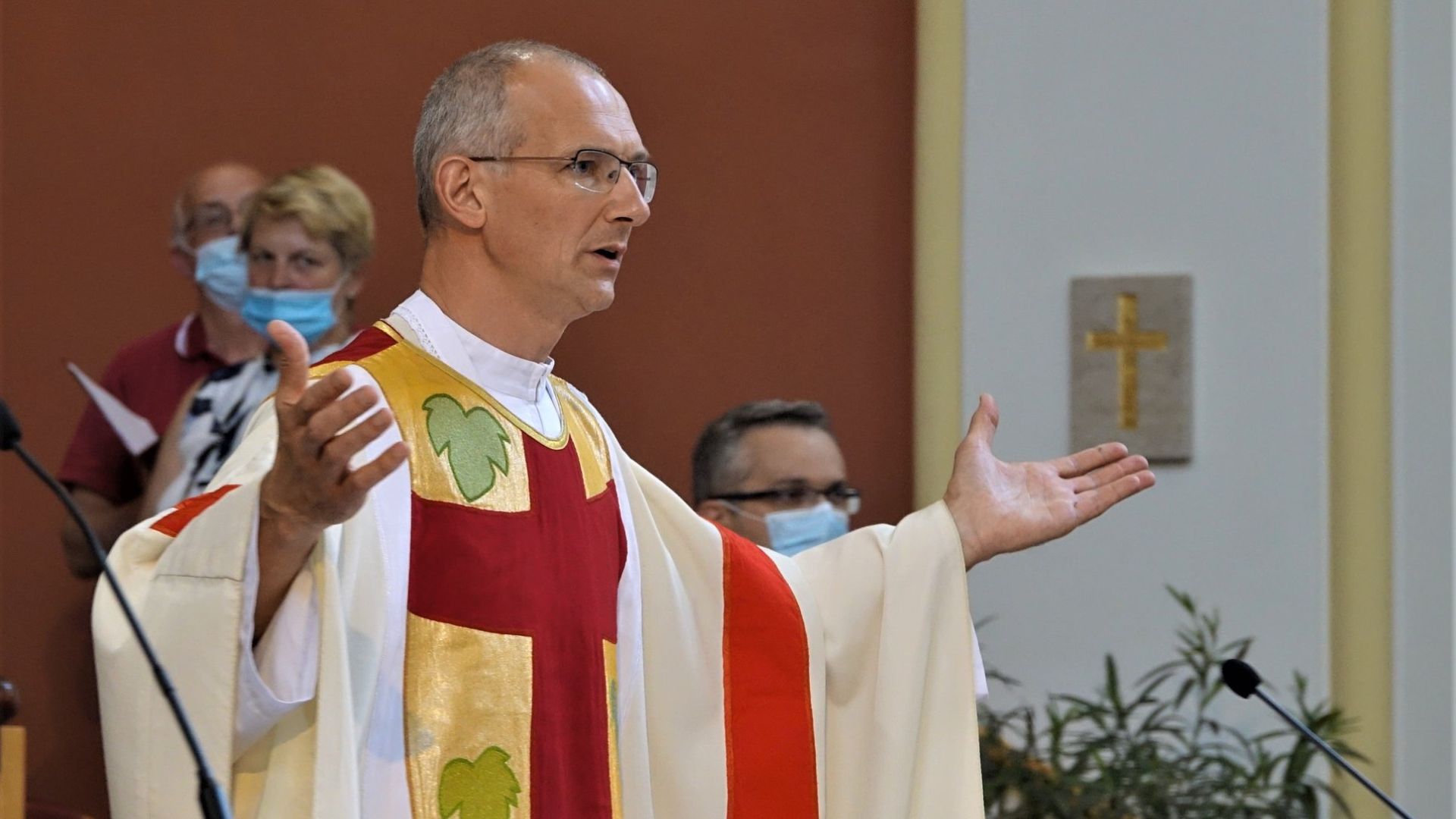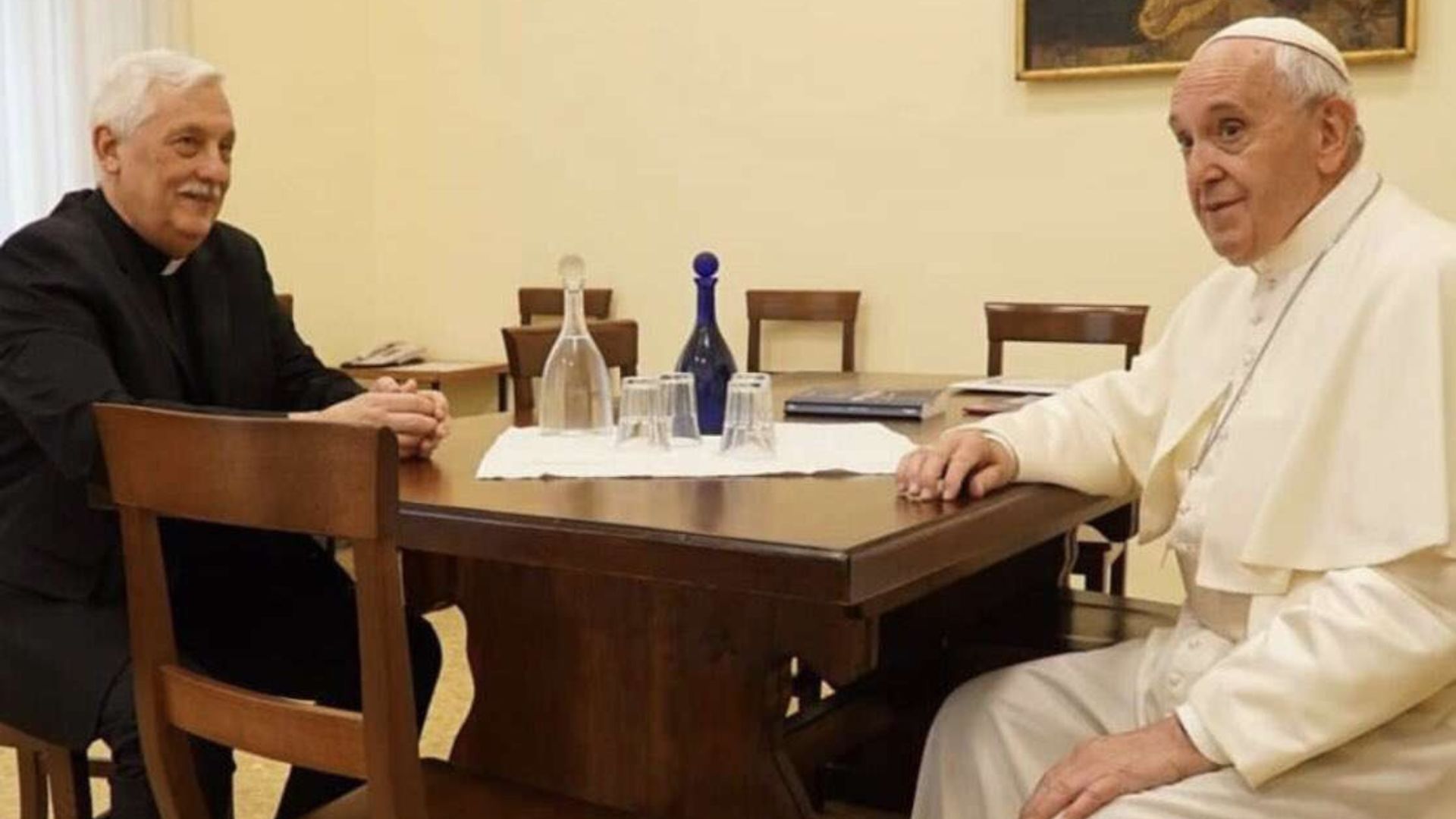While in Portugal, Father Arturo Sosa was interviewed about the Rupnik case.
🇮🇹 Caso Rupnik: il Preposito generale lo difende "ha rispettato i provvedimenti"
🇪🇸 Rupnik case: el Preposito general lo defiende “ha respetado las medidas”
The Superior General of the Society of Jesus, Fr. Arturo Marcelino Sosa Abascal, was in Portugal these days to visit some Jesuit institutions in the Country. At the end of the Holy Mass celebrated at the Father António Vieira University Centre (CUPAV), in Lisbon, some journalists from 7margens interviewed him asking for explanations on the news concerning Father Marko Ivan Rupnik that has been leaked in recent days.
Over the past few hours, several Jesuits have taken a position on the case. Among them are Father Miran Žvanut, Provincial of the Slovenian Jesuits, and Father Gianfranco Matarrazzo, former Provincial of the Euro-Mediterranean Province (Italy, Albania, Malta and Romania).
Žvanut, appointed by Father Sosa in 2020, reported: “Unfortunately, as always, the news is rather overblown and full of falsehoods. The complaint did not come from the nuns, as some media falsely claim. However, as part of the preliminary investigation, precautionary measures were taken against Fr Mark Ivan Rupnik, I repeat, precautionary measures, and no sanctions or bans by the Vatican, as we have seen in the media. Precautionary measures are just something normal when there are accusations of this kind, or similar, against a religious. Father Marko Ivan Rupnik has lived outside Slovenia for over 20 years, so as a provincial I am not directly involved in this investigation. The delegate of the International Houses in Rome is currently in charge of it, but of course he is keeping me informed about what is happening and I assume that if he has any new information, he will pass it on to me”.
Silere non possum has a duty to point out that the statements of Father Miran Žvanut are false and it is surprising that the Slovenian Jesuit is not aware of what goes on here in the Vatican.
His speeches and activities are often reported by Vatican News, which is not the case with all priests in the world. Perhaps it would be appropriate for the Jesuit to inform himself before speaking.
Two errors in particular:
- Father Ivan Rupnik's file contains the testimonies of the nuns.
- Precautionary measures are not "something normal" and, above all, must absolutely be revoked when the cause is removed (Can. 1722 CJC).
Canonical penalty or precautionary measure?
The second issue is very important and needs to be clarified by the Society of Jesus.
Canon 1722 states: "The Ordinary, in order to prevent scandals, to protect the freedom of witnesses and to ensure the course of justice, may at any stage of the trial, after hearing the promoter of justice and citing the accused himself, remove the accused from the sacred ministry or from an ecclesiastical office or task, impose on him or forbid him to dwell in any place or territory, or even forbid him to participate publicly in the Most Holy Eucharist; all these measures, when the cause ceases to exist, must be revoked, and they cease for the law itself with the end of the criminal trial".
It is clear, therefore, that these measures are now no longer justified. The Society of Jesus has to explain what the reasons are for these 'precautionary' administrative measures.
There are two possibilities: either the measures are in place because there are still some court proceedings pending or these are accessory penalties contained within the measure that closed the proceedings. Otherwise, they would not be legal.
It is also somewhat unrealistic that proceedings are closed because they are declared time-barred, but at the same time accessory penalties are applied.

Furthermore, the words of Father Miran Žvanut raise a smile. At a time when he has not been asked anything, as the cleric is not responsible for Father Rupnik, he chooses to speak out publicly to defend him. He pays no attention to the facts themselves but reports that "they are inflated". Žvanut must be reminded that his confrere Hans Zollner said: "Criminals are hiding among us, we need an investigation in Italy too". Was Zollner also talking about Rupnik? Or is he exempt?
The Italian and European bishops who have been accused by Father Zollner over the years are wondering why the German Jesuit is now silent. Does Father Miran Žvanut not think that the German Jesuit's words were a bit strong? The risk is to spread the idea among people that only thugs are hiding in the presbytery.
The German, director of the Gregorian University's Institute of Anthropology, however, chose not to say a single word about Ivan Rupnik. How come? Shouldn't he have been transparent? As usual, these puritans, Pharisees of the last hour, are good at lecturing but when it comes to making an examination of conscience they keep silent.
Of a completely different tone, however, is the intervention of the former provincial Matarazzo: “With all my limitations, I am trying to give my life to the Catholic Church through the Jesuits. The mortifying dichotomy "conservative or progressive" has never belonged to me. But it has to be said: the "Rupnik case" is a tsunami... ...of injustice, lack of transparency, questionable management, dysfunctional activity, personalised work, apostolic community sacrificed to the leader and unequal treatment. And the Jesuit statement relaunches this tsunami. A paradigmatic case of justice denied. Not even the alleged perpetrator
has been helped. A deadly damage to the Jesuit Order, but even more so to Holy Mother Church. Another case study, as if it were not enough that has happened so far. What is to be done?
- Accept full responsibility and consequences.
- Offer a detailed reconstruction of everything that happened.
- Convene a press conference and answer all questions in a transparent manner, without having to make run-up additions because forced to.
- Open wide the archives.
- Fr. Hans Zollner S.J., who is credited as an authoritative voice on the subject of abuse and is always demanding of the bishops with respect to the handling of this tragedy, take a stand on his Order.”
Father Matarazzo also asked that Father Zollner, in view of his many sermons to the world, now have the good grace to say a few words.
Zollner's behaviour is emblematic of all those who have kept silent or cried conspiracy on Rupnik. However, serious reflection on the subject is necessary, just as we have said about some of the press articles.

We absolutely do not believe that it is necessary to "open the archives wide", because the Code of Canon Law is clear on the subject and the confidentiality, of both the victim and the alleged aggressor, must be guaranteed. It is also necessary that when the case is closed, notification of the decision is given. This is essential because, otherwise, as has happened in recent months, he (or she) who is affected by measures or punishments could continue to do what he wants undisturbed.
At the same time, it is also a guarantee for those who are wrongly accused, so that it can be clear that they are innocent. This means that people must also learn that when the Ecclesiastical Court (or the Dicastery) rules, the decision is final and has authority. One cannot hear those newspapers recriminating civil competence. Everyone has their own competence, everyone acts freely according to their own order.
Father Sosa interview
In the interview that has been made to Father Sosa, who says he is convinced that Father Rupnik does not hold exercises, the defensive attitude clearly emerges. Sosa even says that Rupnik has always respected the measures imposed. In reality, this is not the case at all. We find it rather hard to believe that Father Sosa is unaware that Rupnik has travelled around the world this year and, on several occasions, preached catechesis and meetings.
As we have clearly said, Father Rupnik went to the Parish of Castel d'Ario in August 2022 and held a course of spiritual exercises.
The Portuguese journalists then asked Father Sosa about what we wrote concerning the spiritual exercises planned in Loreto (Italy). Sosa replied that there are no spiritual exercises planned and Rupnik has always complied with what has been imposed on him.
It is clear, therefore, that the Provost General wanted to wash his hands with his communiqué that we published, but at the same time he has no intention of admitting the reality: Rupnik has always continued to do what he wanted.
Father Sosa emphasised that these facts concern "matters between adults". The feeling that is conveyed is that the seriousness of these abuses is being taken away. If minors are abused, it is serious, otherwise not. Even reading the statement, the superior (both Roman and Slovenian) is at pains to point out that minors are not involved. Now, it is clear that child abuse is serious, but it is serious precisely because the child cannot defend itself, it is in a condition of inferiority. As Father Dysmas De Lassus masterfully points out in his book, even the victim of abuse of power, of spiritual abuse, is very often helpless, defenceless and in a condition of psychological subjection.
The risk we commit today is that of the Pharisees. We are justicialists with those who commit the crime of paedophilia and we are condescending with those who commit the abuse of power and spiritual abuse. This is what, we in Silere non possum, have always objected to those who carry on this battle with television methods, the Pilate method. If you do not fight abuse of conscience, you cannot fight sexual abuse. It would be like cleaning the rainwater that falls from a leaking roof. I clean the water that comes down but I don't go and fix the roof.
F.P.
Silere non possum
The text of the interview ⬇️

The interview was conducted by António Marujo:
The Society of Jesus' statement on the Rupnik case was released after the first media reports emerged. Why didn’t the information about what was happening come sooner?
First of all, I must say that for the Society of Jesus every case like this is very painful. Secondly, we must not publish every case. One of the things we are all entitled to as people is a certain privacy: public statements must be made when the facts are public; when they are not public, there is nothing to say, and that does not mean hiding. We have not hidden anything.
In this case, I feel it is important to emphasise a few things. First, that there are no minors involved. In other words, these are matters between adults.
Secondly, we did not receive the complaint, directly, but received it from the Congregation for the Doctrine of the Faith [CDF]. They asked us to carry out an investigation because they had received a complaint. Precisely in order not to hide anything and to investigate as transparently as possible, we sought investigators who were not from the Society of Jesus.
Then we handed over the report to the CDF, which had requested this preliminary investigation. A preliminary investigation is not a trial that ends in a sentence, but it is a first approach to the case. We waited a long time until we received the news, from the Congregation, which had studied the case and the investigation and decided that this was something that had happened 30 years ago and, according to the law, was time-barred. This is the canonical part.
What happened next?
From the moment we received the request to open the investigation, we immediately took precautionary measures, which were proportionate to the facts. Father Marko Rupnik was forbidden from hearing confessions, conducting spiritual exercises, spiritual direction and making any public statements, teaching and any other such activity that had to be authorised by his local superior.
This is what has been done all this time. After we received the notification from the Congregation saying that these were prescribed facts, the measures were maintained. This is because we want to look into the matter, to see how we can help everyone involved.
Your statement makes no reference to the victims. Given the notoriety of Father Rupnik, was the disclosure of the case not justified?
You have to ask the victims. I can’t speak for someone who doesn’t want to.
Why is there no reference to victims in your statement?
Because there was no trial that made it clear that there is a victim here and an aggressor here. The case is prescribed. There is no qualification of the victims, there is a suspicion of facts that went beyond the limits of what is done between adult persons.
Was leaving the management of the Aletti Centre one of the precautionary measures?
That happened much earlier. He left the directorship more than a year ago [in 2020] for reasons within the organisation of the centre, because he had been in charge for a long time and already had many commitments in artistic work.
Father Rupnik continues to travel and do various things. For example, in February, a retreat is planned in the sanctuary of Loreto. Is this not prohibited by the measures taken?
I don't think a spiritual retreat is planned. He is not in prison, nor do any of the measures affect his artistic work. He has very important artistic commitments. He can celebrate the Eucharist, what he is prohibited from doing is leading spiritual exercises or confessing. These are the precautionary measures, because they must be proportionate to the facts.
He continues to have the same mobility as the rest of us, for work reasons. The restrictions he has been subjected to have been respected.